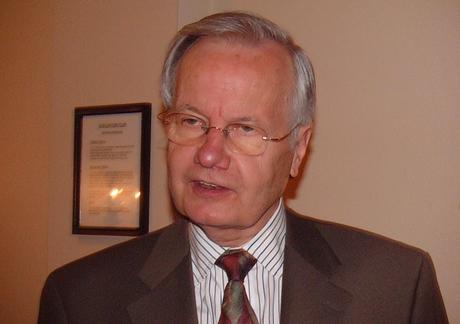
A few days ago, Bill Moyers (pictured) had Paul Krugman as a guest on his show. They discussed the book "Capita; in the Twenty-First Century", and how it applies to what is happening to the economy of the United States (which is becoming more unequal all the time). It was an excellent discussion, and I recommend you either read or listen to the whole thing. Here is Moyers' epilogue to the conversation:
The evidence keeps mounting. Just this past Tuesday, the 15th of April, Tax Day, the AFL-CIO reported that last year the chief executive officers of 350 top American corporations were paid 331 times more money than the average US worker. Those executives made an average of $11.7 million compared to the average worker who earned $35,239. As that analysis circulated on Tax Day, the economist Robert Reich reminded us that in addition to getting the largest percent of total national income in nearly a century, many in the one percent are paying a lower federal tax rate than a lot of people in the middle-class. You will, no doubt, remember that an obliging Congress, of both parties, allows high rollers of finance the privilege of carried interest, a tax rate below that of their secretaries and clerks. And at state and local levels, while the poorest 20 percent of Americans pay an average tax rate of over 11 percent, the richest one percent of the country pays half that rate. Now, neither nature nor nature’s God drew up our tax codes. That’s the work of legislators, politicians, and it’s one way they have, as Chief Justice John Roberts might put it, of expressing gratitude to their donors. Oh, Mr. Adelson, we so appreciate your generosity that we cut your estate taxes so you can give $8 billion as a tax-free payment to your heirs, even though down the road the public will have to put up $2.8 billion to compensate for the loss in tax revenues. All of which makes truly repugnant the argument, heard so often from courtiers of the rich, that inequality doesn’t matter. Of course it matters. Inequality is what has turned Washington into a protection racket for the one percent. It buys all those goodies from government: tax breaks, tax havens, allowing corporations and the rich to park their money in a no-tax zone, loopholes, favors like carried interest, and on, and on, and on. Listen, there’s a big study coming out in the fall from Martin Gilens at Princeton and Benjamin Page at Northwestern, based on data collected between 1981 and 2002. Their conclusion, quote, “… America’s claims to being a democratic society are seriously threatened … the preferences of the average American appear to have only a minuscule, near-zero, statistically non-significant impact upon public policy.” Sad, that it’s come to this. The drift toward oligarchy that Thomas Piketty describes in his formidable book has become a mad dash, and it will overrun us, and overwhelm us, unless we stop it.

